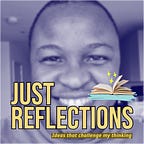My wife and I are home in Zimbabwe and for the last couple of weeks, we’ve been living with our parents. One reality that dawns on you when you live with your parents as an adult is that they’re also doing their best to figure out life one day at a time. Our parents raised us based on the reality they lived in, but by the time we mature, reality has changed a lot. Your parents can no longer help you navigate the unknown because it’s unknown to them as well. I’ve been reflecting on that this week.
We’ve all met people who seem to have everything figured out; they’re determined and ambitious. They can carve out their own destiny and they create their own luck. Nothing seems to get them down. Most of us also know people who seem always to bury themselves in a hole. They’re unable to recognise the opportunities in front of them and they squander the ones given to them. They harbour a lot of negativity towards life, and they seem to be perpetually stuck. Helpless against seemingly endless hostile external forces.
What’s different about these two people? It’s hard, if not impossible, to single out one trait or belief or principle that the latter could adopt to transform themselves into the former. However, there is one thing that successful people seem to share more often than unsuccessful people and I can’t help but think that there’s a strong correlation between having that belief and being successful in life. Most successful people have an internal locus of control and less successful people have an external locus of control.
Locus of Control
The degree to which people believe that they, as opposed to external forces, have control over the outcome of events in their lives
People with an external locus of control believe that when bad things happen to them, that’s just the way the world is and when good things happen, they just got lucky. They have no power to change any of it. People with an internal locus of control believe that they have agency in the things that happen to them, they have control over the direction of their lives and while external circumstances can distract them from their goals; they aren’t enough to deter them.
People with an internal locus of control tend to take responsibility for their actions, regardless of whether those actions or their results are good or bad. On the other hand people with an external locus of control look at everything around them as part of their success or failure.
We all fall somewhere on the spectrum between an internal locus of control and an external one. You included. The extent to which you fall into either of these sides was likely formed in your childhood, through your development years and your transition into adulthood.
Children, especially very young children, have an external locus of control. External forces have a lot of control over the outcome of events in their lives. When you’re a child, you have no agency over what happens to you and its effects. You can fall asleep in your bed and wake up in the grocery store. Somebody just took you along with them and you had no choice. It's not possible to feed or clothe yourself. You fully depend on a parental figure to take care of your needs and provide you with the things you need to survive. You have no choice but to develop an external locus of control, and that’s perfectly fine. There’s nothing wrong with it. That is the nature of what it means to be a child. It’s a factual and realistic belief to have as a child.
But, hopefully, you had a competent parental figure as you were growing up who taught you the ropes. How to cook, how to make money and how to fend for yourself in the world. More importantly, how to deal with new and unfamiliar situations. If your parents did their job right, they eliminated the need for them in your life. And, hopefully, by the time you’re an adult, you still want your parents around, but you don’t need them around. If they were to die, it would hurt, but you’d be okay. You’d fend for yourself and be able to figure things out when you encounter new situations.
Unfortunately, many of us never outgrow the helplessness of childhood and we bring it into adulthood. We never shake the idea that we need to be provided for somehow. We remain dependent on some sort of external system to provide us with the things we need to survive and thrive. Often, this is really hard to spot. From an occupational perspective, it can look like being unsatisfied with your job. You’re working so hard but being paid so little so you externalise this struggle on your boss and blame him for your life’s problems. “My life sucks because my boss doesn't see how much I’m worth and is not paying me enough money.” Or you might look at the government and say, “The government is not giving me the support I need to thrive as a young entrepreneur.” Or your partner and say, “I’m not happy because he spends all his time watching sports and doesn’t give me any attention.”
The tricky thing is that often these are valid complaints. There’s some truth and logic to them. You really aren’t paid your worth and the government really isn’t supporting you and your partner really doesn’t give you enough attention. But the default shouldn’t be to place all the blame and responsibility for changing the outcome of our lives onto these external forces. Otherwise, we’re going to be imprisoned by them our entire lives and we’ll feel helpless. Our default should be to look at the cards that we’re given and take full responsibility for how we play those cards in the circumstances that are in front of us.
Having this internal locus of control is extremely important in this time we’re living in. Right now there’s a looming economic recession, and it’s worsened by rising energy prices that are threatening to cause a pretty uncomfortable winter (if you’re in Europe like me). People are being laid off from their jobs, the climate is doing all kinds of weird things. There are threats of more wars and rumours of more pandemics. Everything feels so out of our control that it's easy to fall into a pit of despondency. And then that childlike helplessness creeps in and it feels like you have to put your entire life on hold until this period of uncertainty passes. Then, only after that can you go back to your weight-loss goals and your career ambitions and everything else.
We need to realise that we can work amidst this cloud of uncertainty. There are things we can do to improve our lives despite everything going on around us. It’s your sole responsibility to figure out how to thrive within the environment you’ve been placed. It’s no one’s responsibility to come and be your knight in shining armour and fight the dragons in your life. The responsibility is yours and yours alone.
Hopefully, you don’t take this as a scolding, but as empowerment. When you adopt more of an internal locus of control, it will feel less like life is happening to you and more like life is happening due to you. And that’s a very empowering belief to have. In fact, this shift in perspective might be a prerequisite to making any substantial change in your life. Your positive actions in working your way out of an unpleasant situation do have an impact. The good habits you’re building are transforming you. Your efforts are not in vain. Not only do you have the power to change your life, you’re the only one who does!
The other side.
While I’m clearly advising you to strive to have an internal locus of control, there are disadvantages to being on the extreme end of the spectrum. As I said, people with an external locus of control tend to believe that everything that happens to them is entirely because of their direct efforts or actions. However, reality is not so simple. Our success is rarely entirely because of our actions alone. Sure, you may have put in a tonne of effort but you exist within a bigger society and other people had to be doing their part for your part of work the way it did. If we take the external locus of control to the extreme, we may easily discount the efforts of other people in our endeavours.
Second, people on the extreme end of the internal locus of control will be hard on themselves and constantly analyze what they did wrong. That perspective can cause them to be hard-charging, driven individuals who have a harsh take-no-prisoners attitude.
These two factors can make people with an external locus of control—which we should all strive for—hard people to work with in a team. One way to find balance is a phrase I heard from a friend several years ago.
Look through the window when giving praise and look at the mirror when giving blame.
Cultivating an external locus of control.
While every outcome is determined by a combination of factors and never by the efforts of one person. The idea is what you believe about your life’s outcome affects how empowered you feel and how much effort you will put into the future to achieve the results you want. It’s a self-fulfilling prophecy. Your locus affects your behaviour. Which affects your outcomes. And those outcomes reinforce your locus. That’s the bottom line here.
So how do you change the prophecy of being a victim of bad luck or terrible circumstances? You change your mindset and behaviour to get a trickle-down effect of changing outcomes and reverse the vicious cycle. These different outcomes will positively reinforce the idea that your active efforts matter.
Here are four ways to make your locus of control more internal:
Deconstruct the blame process. Recognise when you blame someone or other circumstances for your situation. Think about what your role was in the situation and then think about one thing that you could have done differently to change the outcome. It could be as simple as, “I could have left the house 15 mins earlier,” or “I could have started on the project a day earlier.” Then file that away as an option to use the next time you’re in a similar situation.
Plan to take risks. Even if they’re minor risks. Since people have different risk thresholds, how you do this is very personal. Think about a situation that makes you uncomfortable. The risk you take could be volunteering for something or speaking up in a group or asking someone for a favour or being the first person to show up for an event. These are all things that take some assertiveness to do and if you fail or get a ‘no’, there’s an emotional price to pay, like feeling disappointed or insulted. But the more you take these risks, the better you get at the risks. And then when you do get a positive result, it reinforces the concept that you do have some control over whether or not you get what you want.
Embrace failure. Piggybacking on taking risks is becoming comfortable with disappointments and seeing them as a stage or an experience that’s one of many in your life. This ties together with a growth mindset over a fixed mindset, which I wrote about here. With a growth mindset, you see yourself as being able to adapt to circumstances in a way that advances you to a higher place. So a disappointment is a temporary step backwards or a pause in your progress, it’s not a permanent state. With a fixed mindset, you believe that you’re stuck with the resources you have and there’s no room for improvement, so disappointments inflict permanent damage.
Focus on the things that you can control. It’s easy to feel overwhelmed when you spend too much time thinking about all the factors that are not affected by your efforts. You can’t control acts of nature or the economy. And to bring it closer to home, you can’t control other people. So when you have a situation that involves other people like a relationship problem, even as you recognise what the other person is doing wrong, know that you can’t control them. You can only control how you respond to their behaviour. If their behaviour damages you, focus on how you can limit your contact with them or limit how vulnerable you allow yourself to be with the person.
Seeing as the holiday season is coming up, you might meet up with the older members of your family who were parental figures to you and face the reality of your parents no longer being able to help you navigate the unknown because it’s unknown to them as well. In fact, they might look at you to be a wise guide who knows better. It's quite something facing the reality of your parents being human too. It definitely transforms the way you view yourself and the world. They were also doing the best they could with what they knew. It's a space for grace for everyone and a tremendous shift in what's possible for you and your life. I know all this is easier said than done, but it must be done. If you change nothing, then nothing will change.










